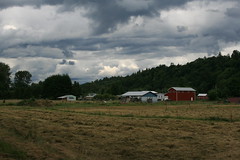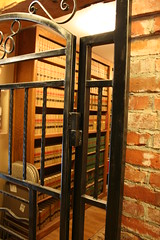This story was written for the Editor Unleashed Flash Fiction 40 Contest.

She cradled the cracked plastic wagon like a fetal twin. An unlikely rose bush stood sentinel, wilting yellow petals onto the earth of this mobile womb. He would have made the call immediately, had he not discovered her while urinating in the alley. The patrol bike leaned lazily against the brick wall, while he stepped around the bizarre scene, radio in hand, words evaporating with the evidence of his detour. The woman was dead. He made the call and waited.
The cramped alley soon swarmed with experts and he repeated his brief account to each as they filtered through the crowd of onlookers. A detective asked if he knew the identity of the victim. He didn’t, but he caught a glimpse of Magda in heated discussion with a phantom. He motioned with his head, “Ask Magda. She knows everyone around here.”
Magda never lied. Sometimes she refused to speak, but she never lied. He watched the detective approach and touch Magda on the shoulder. She transferred her verbal assault from her invisible opponent to the unsuspecting detective, and he stepped back and returned to the scene, rolling his eyes at Kettering as he passed. Kettering crossed the street and sat on the curb, straightening his yellow shirt, acutely aware he’d been wearing it for fourteen hours.
Magda was the cleanest homeless person he had ever met. She wore three layers of clothing and washed the innermost layer each night. The others respected her, needing her information and fearing her knowledge. She stood over him, hands on hips, “You found Miss Elizabeth. Good. Good.” He waited for her to continue, but she stepped away and resumed her dialog. He went back for his bike and the detective’s card, before returning to Magda’s lair.
She was oblivious and he walked away. Before he reached the end of the block, she shouted, “This way!” He followed and she led him briskly up the hill and away from the bay. They left the heart of the city and she remained silent. They entered a neighborhood of stately brick homes, and he wondered why he was there and not at home, asleep and clean. This was his last shift. Monday held new promise.
Magda stopped in front of a restored Tudor, violent growth punctuating vacant windows. He fingered one of the realtor flyers and noted the historic home would soon be up for auction. Magda flopped down on the stone steps and arranged her skirts with her good arm. She removed a cigarette from an inside pocket and chewed it peacefully. “Miss Elizabeth home.”
Kettering controlled his twitching eyebrow, “She lived here?”
“Stole that wagon. Watched her do it, too. Come up here and dig that plant. Soft white hands. Say her mama give it her.”
He nodded, steady hands offering a lit match. They sat silent and watched the crossing ferries on the bay. Sunrise painted a thousand blushes on the towers of the Emerald City. Kettering worked nights, bar fights and crowd control, keeping things pretty for tourists. “I hadn’t seen her before. Was she around long?”
“Few moons. See her days. She turn nights for Doc.”
Doc ran one of the elite social clubs in the city. His best girls worked and lived in the cliff-side home, where he had no tolerance for substance abuse or disease. Doc’s place was squeaky. Frequented by politicians and the techno-riche, Doc’s was only available by invitation, and transactions involved trade, not cash. Girls and guests were treated like royalty. Doc was untouchable, like Magda.
She rose and started the trek back down the hill, her posture discouraging company. He heard the faint statement to the water below, “I give her wings.” Magda was a liaison, a distributor. She worked for a clean needle project, gathering waste from the street zombies in exchange for pristine hope in plastic wrap. No one really knew if she used or carried or dealt.
He knew her words were true, but didn’t know if he cared any more. He finished the tedious out-processing, without divulging his knowledge. They would figure it out eventually, if they hadn’t already. He returned home and steamed away fifteen years, cleansing his mind and body before burying himself in dreamless sleep. He spent the weekend in bed, attempting to adjust to the new schedule.
On Monday, Mr. Kettering mounted his bike to ride into his dreams, and then abruptly halted the habitual process. He decided, instead, to break in his new shoes, stopping for coffee on the way. Pulling his card from the thin wallet, he noticed the detective’s card and remembered Magda’s broken story. He felt a sense of responsibility in his new shoes.
He visited the lounge on his lunch break and waited to use the only public telephone. The detective was in, and remembered him from the scene. Mr. Kettering gave him the woman’s name and address, and prepared to hang up the phone. The detective spoke, “We’ve got everything. It was all there. She kept it in the dirt under that plant; passport, jewelry, empty prescription bottle. Huh. Even a few of those posh-red fingernails.” He paused and Mr. Kettering remained silent, hoarding his knowledge. “Her ex says she was addicted to pills. She lost her job, some mortgage scam. Lost it all. He took the kids and moved in with his folks, down in New Mexico. He thought she was with friends. Didn’t know she was on the street. Too bad, really. Looks like she only used a few times. Bad stuff.”
Mr. Kettering thanked the detective for the update, and replaced the handset in the cradle. He stood and walked from the room, glazed eyes translating his image in the polished shoes. A single scuff obscured reality. He breathed the elements of his new life; burnt coffee and stale popcorn, anxiety and hope. He pulled open the metal door, his own door, and consumed the view. A room full of expectant young faces offered the promise of perspective.








